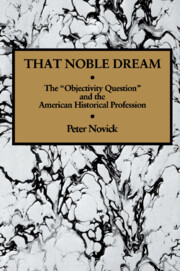Book contents
- Frontmatter
- Contents
- Preface
- Introduction: Nailing jelly to the wall
- I Objectivity enthroned
- 1 The European legacy: Ranke, Bacon, Flaubert
- 2 The professionalization project
- 3 Consensus and legitimation
- 4 A most genteel insurgency
- II Objectivity besieged
- III Objectivity reconstructed
- IV Objectivity in crisis
- Appendix: Manuscript collections cited
- Index
3 - Consensus and legitimation
Published online by Cambridge University Press: 29 March 2011
- Frontmatter
- Contents
- Preface
- Introduction: Nailing jelly to the wall
- I Objectivity enthroned
- 1 The European legacy: Ranke, Bacon, Flaubert
- 2 The professionalization project
- 3 Consensus and legitimation
- 4 A most genteel insurgency
- II Objectivity besieged
- III Objectivity reconstructed
- IV Objectivity in crisis
- Appendix: Manuscript collections cited
- Index
Summary
No community can be satisfied that its discourse is objective—or even know what it would mean to be objective—without substantial agreement on values, goals, and perceptions of reality. All of the factors so far considered could not, in combination, have established objectivity as the accepted norm within the American historical community at the end of the nineteenth century were it not for one additional factor: the extraordinary degree of ideological homogeneity within that community.
If university administrators restricted their faculty members to the objective presentation of approved orthodoxy, this was not an onerous constraint on historians who showed no visible signs of serious heterodoxy. If scientific historians' involvement in producing historical work for schoolchildren was avowedly for purposes of legitimating the social and political order, this was untroubling to historians for whom that order was not at all problematic. By presenting an “impartial” account of the American Civil War and the American Revolution—in both instances, an account based on the “objective truth” of scientific racism—historians could simultaneously demonstrate their own detachment and render valuable public service by furthering the goal of reconciliation between North and South and between the United States and Great Britain.
The word “ideology” has been so loosely used and variously defined in recent years that I should, at the outset, make clear how I will be employing it. In orthodox Marxist usage the word refers to a viewpoint directly tied to the standpoint of a particular social class.
- Type
- Chapter
- Information
- That Noble DreamThe 'Objectivity Question' and the American Historical Profession, pp. 61 - 85Publisher: Cambridge University PressPrint publication year: 1988
- 1
- Cited by

